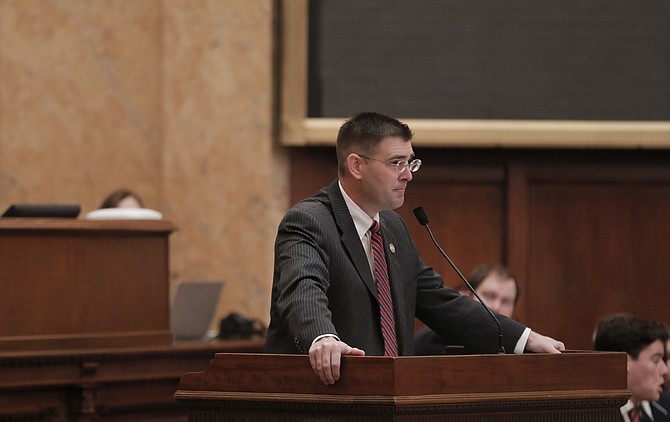House Judiciary B Committee Chairman Andy Gipson made the announcement about House Bill 1505 on Monday, after supporters of the exemption spent the weekend calling and leaving messages for lawmakers. Photo by Imani Khayyam.
JACKSON, Miss. (AP) — Mississippi lawmakers will not vote this year on creating a religious exemption to Mississippi's vaccination requirements, a committee chairman says.
House Judiciary B Committee Chairman Andy Gipson made the announcement about House Bill 1505 on Monday, after supporters of the exemption spent the weekend calling and leaving messages for lawmakers. Tuesday is the first major deadline of the three-month legislative session.
Gipson, a Republican from Braxton, said House Speaker Philip Gunn will appoint a study committee. Gipson said he believes the group will propose legislation that could be considered in 2019, but it is possible the Health Department could resolve critics' concerns by setting new rules about vaccination exemptions.
The delay pushes a contentious issue into a state election year, when all state House and Senate seats will be on the ballot and most current lawmakers are expected to be running again.
During a meeting last week, Judiciary B Committee members heard from parents who said Mississippi requires too many vaccinations before children can go to daycare or attend public or private school. Some said they are home schooling their children because of concerns about vaccines that were cultivated in cell lines obtained from fetuses aborted in the 1960s.
Mississippi has long had one of the highest child vaccination rates in the country. Gipson said Mississippi, California and West Virginia are the only states without a religious exemption.
"The unavailability of any religious exemption in Mississippi is troubling to many parents, myself included," Gipson said Monday.
He cited, in particular, the fact that some vaccines are cultivated in cell lines originally obtained from fetuses aborted decades ago. Many churches that oppose abortion say it's acceptable for believers to receive those vaccines anyway.
Gipson said the study committee would focus on whether there should be a religious exemption and on how Mississippi's current medical exemption works. Some opponents of the current law complain that district health officers, who decide on medical exemptions, don't act uniformly.
The state health officer, Dr. Mary Currier, told the Judiciary B Committee on Wednesday that viruses used in some vaccines are grown on tissue that originated from abortions in the 1960s.
"Nobody likes that. I don't like that," Currier said. "I sincerely hope that the companies that make these vaccines are working on that issue, to provide vaccines that are not from these tissues."
Currier opposes weakening Mississippi's vaccine law, saying, for example, that measles "is not a benign disease." In the U.S., about 1 in every 20 children who contracts measles will develop pneumonia, she said.
"We've been very lucky here in Mississippi" to not have a measles outbreak, Currier said, attributing that to the state's high vaccination rate.
During the committee meeting Wednesday, some people seeking broader exemptions in the vaccine law said their children or grandchildren developed problems after vaccinations.
Dr. Scott Guidry, who is a surgeon in Hattiesburg, and his wife, Mary Jane Guidry, who is a nurse, said their son had brain damage 24 years ago and they attribute it to vaccinations. Mary Jane Guidry said the state should not be able to control what is injected into children's bodies.
"No one should have the power to ruin your life simply because they think it's going to make someone else's better," Mary Jane Guidry said.
Life-threatening reactions to vaccines are rare, Currier said: "People who are vaccinated are not any more likely to have autism than people who are not vaccinated."
Copyright Associated Press. All rights reserved. This material may not be published, broadcast, rewritten, or redistributed.


